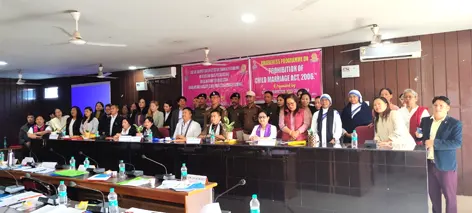YUPIA, 31 Jan: The ICDS cell here in Papum Pare district organised a sensitisation programme on the Juvenile Justice (JJ) Act and Rules, the POCSO Act, the rules and regulations of adoption, and the Prohibition of Child Marriage Act, 2006, on Tuesday.
Addressing the stakeholders, Papum Pare SP Dr Neelam Nega cited poverty and polygamy as “the two main reasons for juvenile delinquency,” and urged parents to be “more responsible in nurturing the child and keeping them away from committing crimes.”
ICDS Deputy Director (i/c) Tana Chammaro introduced the stakeholders to Mission Vatsalya.
“The erstwhile child protection services implemented by the women and child development ministry have been subsumed under Mission Vatsalya from 2021 onwards. Mission Vatsalya promotes family-based, non-institutional care of a child and aspires to secure a healthy and happy childhood for each and every child in India and ensure opportunities to enable them to discover their full potential and assist them in flourishing in all respects in a sustained manner,” she informed.
Speaking on the Juvenile Justice Act & Rules, Maling in her address stressed on the roles of “juvenile police officers,” the CWCs and other stakeholders in ensuring proper implementation of the JJ Act.
Oju Welfare Association chairperson Dr Anya Ratan apprised the participants of the legal procedures for adoption, and urged them to “refrain from illegal adoption,” while ICR Juvenile Justice Board member Oyam Binggep spoke about the POCSO Act & Rules and the Prohibition of Child Marriage Act, 2006.
She urged the stakeholders to “treat POCSO case victims in a most sensitive manner.”
ZPC Chukhu Bablu also spoke.
Administrative officers, ZPMs, members of the Papum Pare special juvenile police unit, medical officers, members of childcare institution Emmanuel Rehabilitation Centre, the Papum Pare Child Welfare Committee and Juvenile Justice Board, paralegal volunteers, CDPOs, and district child protection unit staffers participated in the programme. (DIPRO)


